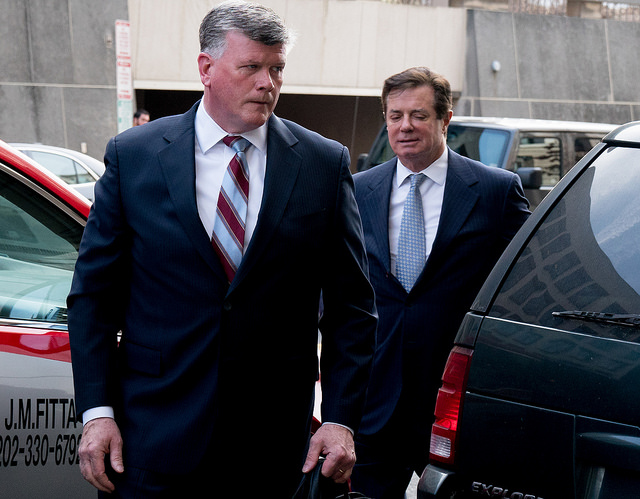The Manafort Guilty Plea, the Mueller Investigation, and the President
Only three weeks ago, the president of the United States lauded Paul Manafort for bravely rejecting any cooperation with Special Counsel Robert Mueller:

Published by The Lawfare Institute
in Cooperation With

Only three weeks ago, the president of the United States lauded Paul Manafort for bravely rejecting any cooperation with Special Counsel Robert Mueller:
I feel very badly for Paul Manafort and his wonderful family. “Justice” took a 12 year old tax case, among other things, applied tremendous pressure on him and, unlike Michael Cohen, he refused to “break” - make up stories in order to get a “deal.” Such respect for a brave man!
— Donald J. Trump (@realDonaldTrump) August 22, 2018
So much for that.
On Friday, Manafort, who was chairman of Donald Trump’s presidential campaign from June to August 2016, pleaded guilty in federal district court in Washington to two charges of conspiracy against the United States—one involving a lobbying scheme that involved financial crimes and foreign-agent registration violations, and the other involving witness tampering. In the course of his plea, Manafort also admitted guilt on bank-fraud charges on which a federal jury in Virginia hung last month. And in exchange for the special counsel’s office dropping the remaining federal charges against him in the District of Columbia, he stopped “refusing to ‘break’” and entered into a cooperation agreement that obligates him to “cooperate fully, truthfully, completely, and forthrightly with the Government in any and all matters” in which it may need him.
White House Press Secretary Sarah Sanders hastily sought to put distance between the plea agreement and the president, stating: “This had absolutely nothing to do with the President or his victorious 2016 Presidential campaign. It is totally unrelated.”
As it was with the president’s tweet three weeks ago, the White House is once again way out on a limb.
The grain of truth in Sanders’s claim is that most, though not all, of the criminal conduct to which Manafort admitted preceded his work for the Trump campaign, and none directly implicates the campaign itself or Trump. But it is only a grain. For one thing, Trump constantly boasted of hiring the “best people”—and even in March 2016, when Manafort first joined the campaign, it was clear that he was superlative chiefly in influence peddling on behalf of unsavory characters close to Russian President Vladimir Putin. His questionable reputation and murky relationships with former Ukrainian president Viktor Yanukovych and Russian oligarch Oleg Deripaska were matters of public knowledge long before the campaign began.
Indeed, though the specific crimes to which Manafort has now pleaded were not yet public, the most rudimentary vetting would have flagged him as a person of particularly high risk. As Franklin Foer noted in the Atlantic last month, Sen. John McCain rejected Manafort’s involvement in the 2008 Republican National Convention because of his disreputable ties even back then, before his involvement with Yanukovych. Trump hired him anyway.
And it gets worse for the president. Manafort has admitted to committing crimes while serving as Trump’s campaign manager, although those crimes were not committed in his capacity as campaign manager or on behalf of the campaign. Manafort was found guilty in Virginia on, among other charges, a bank fraud allegation involving conduct that the indictment describes as continuing through May 2016—the second month of Manafort’s formal involvement with the Trump campaign. But as part of his plea on Friday, Manafort admitted to the charges against him in his Virginia trial on which the jury hung, including charges of bank fraud that took place between April and November 2016—that is, during the time in which he led the Trump campaign. He also admitted that during his time as campaign chairman, he had still not met his disclosure obligations under the Foreign Agents Registration Act (FARA), incurring criminal liability.
In this conduct, Manafort was not alone. He is the third Trump campaign official to plead guilty to having undisclosed relationships with foreign actors that he was obliged by law to make public. According to documents filed by the special counsel, Michael Flynn, Rick Gates and Paul Manafort, each of whom served in an official capacity on the campaign, failed to disclose ties to a foreign power in violation of FARA. Three points, as they say, make a pattern—and this pattern is seriously troubling. Surrounding the man who became president were multiple individuals—including his campaign chairman, his deputy campaign chairman and his campaign adviser—who surreptitiously represented foreign interests within the United States. They are also individuals whose potential criminal exposure, in the form of their failure to register under FARA, was known to foreign interests in a position to use it as leverage. One of them—Flynn—went on to join the White House as national security adviser.
All of which is to say that the White House doth protest too much. While Manafort’s plea, in contrast to Michael Cohen’s last month, does not implicate the president or the campaign in any felonies, it is not entirely separate from them either.
As media outlets breathlessly reported, Manafort has agreed to cooperate with prosecutors. What that means in practice is not clear, and readers should be wary of anyone who claims with any confidence to know what Manafort’s cooperation will bring.
Included in the plea agreement is a fairly standard cooperation clause. Manafort has agreed to cooperate “fully, truthfully, completely, and forthrightly” with law enforcement entities, “any and all Grand Juries,” and trials in “any and all matters” that the government deems relevant. Sentencing in both this case and the one in the Eastern District of Virginia can be delayed until after Manafort’s cooperation is completed, as determined by the government. The agreement also states that “no additional criminal charges will be brought against the defendant for his heretofore disclosed participation in criminal activity.” This language, which is also standard fare, leaves open the possibility that criminal conduct not disclosed already could form the basis for new charges against Manafort. Prosecutors stated in court that Manafort has already proffered information to the special counsel’s team—and so it is reasonable to expect and Mueller has decided that this information is both complete enough and useful enough to warrant foregoing further charges. The agreement allows for prosecutors, later on, to move for leniency from the sentencing judge based on “substantial assistance in the form of truthful information and, where applicable, testimony.” Importantly, according to the plea agreement, the parties agree that Manafort’s sentencing range under federal sentencing guidelines is very long. Manafort has explicitly agreed not to seek a sentence outside that range on any grounds. In other words, the only way for Manafort to avoid spending most of the rest of his life in prison is for the government to file such a motion based on his cooperation. If Manafort wants to not spend the rest of his life in prison, in other words, he had better have something to say. In short, Manafort has had every incentive to be forthcoming so far and has every incentive going forward to cooperate fully.
But that does not answer the question of what information Manafort may have to contribute to the investigation—or, indeed, if he has substantial assistance to offer at all.
Manafort is clearly corrupt, and he seems to have quite a few corrupt associates, so one possibility is that he might be able to tell the Mueller team a great deal about influence peddling and graft involving any number of people at some remove from the Trump campaign. Ominously for Trump, of course, Manafort was also in attendance at the infamous Trump Tower meeting in June 2016 and is plausibly in a position to confirm or contradict the accounts of others regarding what occurred and Donald Trump’s personal knowledge of events. That may be significant: Donald Trump Jr. and others have testified before Congress that President Trump was not aware of the meeting at the time or soon thereafter, and the Special Counsel’s Office has demonstrated a willingness to indict individuals for making false statements. More generally, Manafort was chairman of the campaign for a time and may be able to answer any number of outstanding questions about what happened in the months he was there. He is also an inherently interesting figure because he is one of the only people with direct ties to both the senior levels of the Trump campaign and the Kremlin’s friends on the other side of the Atlantic.
But, of course, there is another possibility, which is that Manafort actually does not know all that much and that the main benefit Mueller gets from this deal is not Manafort’s “flipping” but simply his capitulation. Most criminal cases don’t go to trial, after all. Most defendants plead. And most prosecutors accept plea bargains not because the defendant has the keys to some mythical kingdom but because trials are expensive and time-consuming. One possibility here is that Mueller is getting a favorable resolution to his prosecution of Manafort, but not a great deal else from him.
Much of the story described in the superseding information and statement of offense has already been made public in previous indictments filed by the special counsel’s office against Manafort, primarily in the October 2017 indictment filed in Washington. The documents released Friday do not substantially add to the public record on the charges of tax and bank fraud to which Manafort has now pleaded guilty or was convicted of in the Virginia trial last month. Tthe new material largely concerns his lobbying activities from 2006 to 2015, during which time he was working on behalf of Yanukovych—coordinating the “Hapsburg group” of former high-level European officials to lobby in the U.S. on behalf of Ukraine and working to discredit former Ukrainian prime minister Yulia Tymoshenko, who was jailed under Yanukovych’s government.
Specifically, Manafort has pleaded guilty to “intentionally [lobbying] without registering and providing the disclosures required by law” under the FARA and seeking to persuade others he worked with to avoid disclosing their lobbying as well. As described by the special counsel, Manafort assembled the Hapsburg Group as part of a larger effort to push what he referred to as an “Engage Ukraine” global lobbying push. He used his connections with one member of the group—identified in the information as “a former Polish President” and “representative of the European Parliament with oversight responsibility for Ukraine”—to obtain “inside information” on the parliament’s position toward Ukraine, according to court documents. That member of the Hapsburg Group also lobbied U.S. senators against a resolution critical of Yanukovych’s treatment of his political rival Tymoshenko without disclosing his connections to the Ukrainian government. And another met with “senior United States officials in the executive and legislative branches” along with the president and vice president—who at that time would have been Barack Obama and Joe Biden.
The information and statement of offense also run through the previous allegations about Manafort’s work coordinating the production and rollout of a report on Tymoshenko’s trial, for which he commissioned the law firm Skadden, Arps, Slate, Meagher & Flom (identified in the information as “Law Firm A”). The documents list new details on Manafort’s efforts to “tarnish” Tymoshenko in U.S. media: He has pleaded guilty to disseminating stories that Tymoshenko had “paid for the murder of a Ukrainian official” and that “a senior Cabinet official … was supporting anti-Semitism because the official supported Tymoshenko, who in turn had formed a political alliance with a Ukraine party that espoused anti-Semitic views.” (Court documents state that Manafort worked with an Israeli government official to release a public statement on the matter; a Guardian report from April identifies an October 2012 Breitbart article as the likely fruit of Manafort’s efforts.)
The criminal information also includes a number of replicated exhibits, including correspondence and memos detailing Manafort’s public relations and lobbying strategy on behalf of Yanukovych and the creation of the Habsburg Group. The documents outline Manafort’s plan to promote Yanukovych’s interests in the United States and Europe, which, according to the plea agreement, Manafort then executed almost to the letter.
One puzzle that persisted over the course of Manafort’s trial in the Eastern District of Virginia, especially as the overwhelming strength of the prosecution’s case became apparent, was why Manafort was risking a trial at all. By the time he pleaded, his negotiating position—what Trump would call his “leverage”—was substantially diminished from where it had been had he cooperated earlier. Many commentators theorized that perhaps Manafort was holding out hope that if he refused to cooperate he would be rewarded with a presidential pardon. Trump himself fueled such speculation by refusing to deny that he might pardon Manafort. If that was indeed Manafort’s gambit, it appears his faith has finally run out.
A question remains, however, as to whether the president is still in a position to thwart Manafort’s cooperation. And no one really knows the answer. The plea deal having been reached, it is not clear exactly how disruptive a pardon for Manafort now would be on the investigation. Trump could relieve pressure on Manafort to cooperate fully and tell the truth, but the efficacy of such a pardon may well have been substantially reduced by Manafort’s plea—particularly if he has already proffered significant information. In other words, if the president wanted to buy impunity by pardoning Manafort, he really should have done it before Manafort pleaded. Additionally, the political optics of issuing that kind of pardon (which were already terrible) have worsened for Trump. Before, Trump could claim, however implausibly, that he was simply trying to defend an innocent man caught up in a “witch hunt.” Now, a pardon would be a completely transparent effort to impede cooperation and, some commentators have argued, might even constitute grounds for impeachment.
So what does all this mean about the state of the Mueller investigation generally? Again, don’t trust anyone who purports to answer this question confidently. Mueller’s cards remain close to his vest. The information asymmetry between the investigation and the public remains immense.
That said, we think it’s safe to say that the investigation isn’t wrapping up any time soon. Mueller is still seeking and receiving cooperation and thus learning new potentially relevant information. With Manafort’s plea, at least three defendants are subject to cooperation agreements without yet having been sentenced, suggesting that Mueller still thinks they have valuable contributions to make. This group includes former national security adviser Flynn, whose sentencing was pushed back for a second time in July, as well as Rick Gates, who testified last month at Manafort’s Virginia trial. George Papadopoulos and Alexander Van Der Zwaan have both been sentenced, apparently without providing “substantial assistance” to the investigation. The remaining wild card is Michael Cohen, who pleaded guilty in August under an agreement with the U.S. Attorney’s Office for the Southern District of New York, not the Special Counsel’s Office. Cohen’s agreement did not have a cooperation component, but it is reasonable to suspect that he is in a cooperative posture with respect to any federal investigation that might wish to seek his help.
In just the past few weeks, there has been grand jury activity with respect to Trump advisor Roger Stone. There is also the obstruction-of-justice component of the investigation, which has been active since the firing of James Comey as FBI director but about which the public has not heard a word.
In sum, these are not the usual signs of an investigation that is drawing to a close, notwithstanding the insistence of Rudy Giuliani—like Ty Cobb before him—that the probe is concluding imminently. “He has to be winding down,” Giuliani said of Mueller in August. “What else is there?”
The president’s lawyer might want to ask Paul Manafort.








.png?sfvrsn=48e6afb0_5)

